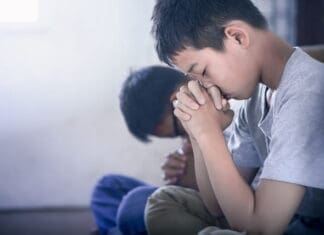Students and adults participating in the #MarchForOurLives this weekend have outlined three main goals they are hoping to accomplish when it comes to gun control:
Banning assault weapons
Requiring universal background checks before gun sales
Passing a gun violence restraining order law that would allow courts to disarm people who display warning signs of violent behavior
We sat down to talk to a group of youth pastors in the trenches of ministry and from a wide range of churches to ask them their thoughts on gun violence, the march, and what students need from adults right now.
After speaking to a youth group in Georgia about the walkout on Wednesday, March 21, 2018, we wanted to know how a handful of youth pastors from churches around Atlanta were addressing the protests with their students and what advice they might give the adults in their congregations for how to respond.
Their responses will renew your faith in a lot of things, namely: The ability of church leaders to listen to one another and discuss an issue from multiple angles, the love ministers have for those they pastor, and possibly even the ability for America to come to a consensus on preventing gun violence we can all (or at least most) agree on.
We’ve compiled the highlights from their discussion in the text below, but be sure to watch the video with your church staff. It will help you minister to your people to understand the reality of youth that youth pastors face on a daily basis.
Why is this happening?
Jay: “I don’t see gun violence as only about guns. I think that the world that we live in has a problem of…how we understand good. And community and value of human life and how to treat people who are different than you. All of these things are playing into it.” – Jay Watts of Life Training Institute
Tom: I think it’s more an issue where we need to focus on mental illness…and then also maybe looking more at different social media platforms…I think before something happens, there’s always warning signs…I don’t know if we always take those seriously enough…
Lack of true, personal relationships with each other. We grew up, and we had to go out and play together. We had to build together, we had to talk to each other. We really had personal relationships. I think, with this generation, because of technology, because of social media, when you don’t have those personal relationships, you really don’t have feelings toward people. You have a generation of young people who really don’t have to communicate with other people anymore. Who really don’t know the feelings of other people anymore. If you don’t have those relationships, it’s going to be easy for me to go and harm a group of people, because I don’t really have a relationship with you, as opposed to me knowing you, and knowing your family, and knowing who you are, and saying, “Well, I won’t do that to you, because I wouldn’t want you to do that to me.” I think this generation has lost just a personal relationship feel. I think we have contributed to it, as adults, because they model what they see nowadays. We have to get back to where it becomes community. We’re talking about it. We’re stressing it, but are we really executing it? – Tom Conley of Berean Christian Church
Do you think the students participating in the walkouts are being manipulated to a certain degree?
Chase: I think we already live in a politically-charged environment…I don’t want to downgrade their access, or the fact that they’re processing this for themselves, but this is viral. This is what’s hot and fresh. It’s probably fair to say that they are repeating talking points. For some of our students, they’re very aware, very conscious of what they see the future being, and what they hope for the future. – Chase Grindstaff of Grayson UMC
Dennis: I think they’re adding to the conversation. I think this is a conversation we all agree needs to happen, and it does happen. Sadly, whenever incidents happen like this, we have these heated conversations. Then, a month, two months pass, and it fizzles out. Then, either a) which horrible as it sounds, another tragic event occurs, and then the conversation shifts. Or, b) we go back to life as normal. I think the danger there is we become desensitized. – Dennis Rivera of The Bridge Church
Jay: I actually worry, too, about how they’re going to deal with disappointment. They’re about to be disappointed. As I said, this is an immense issue, that’s going to take a long, long time, if you want to get traction on it. There’s a sense that they want to go out and see the world change immediately… Just because you were shot at, just because you’re young, does not mean that they are not going to argue with you…I’m not sure they’re realizing how hard the opposition’s going to come. A great deal of that opposition will not be charitable… Some people will be respectful. Some people will dialog with them. Some people are just going to come with hate, right out of the gates. I have very real concerns, as a Christian, and as a man who’s looking after children and young people, and deals with them a lot, how to help them get ready for the difference between the passion that is driving you out right now, and the resolve and grit that you need to determine yourself to get into, if you want to get something done over a long term. It takes a long time to do important things.














